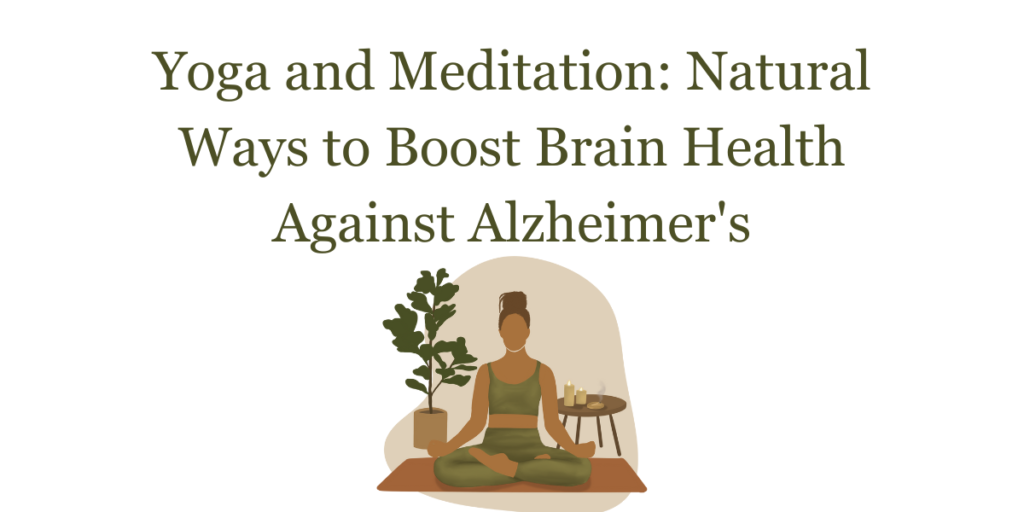With no current cure for Alzheimer’s disease, researchers continue seeking alternative therapies to potentially lower risk, slow progression, and improve quality of life. Two practices generating particular interest are yoga and meditation, given emerging evidence of their cognitive and brain health benefits.
Recent studies covered in MedicalXpress and the South China Morning Post suggest yoga and meditation may positively impact factors related to Alzheimer’s onset and progression. Let’s explore the research and implications.

Meditation for Enhancing Cognition and Communication
Findings from a 2023 study reveal mindfulness meditation can enhance learning new languages, even later in life. Researchers propose meditation strengthens functions like memory, focus, and information processing – all of which decline in Alzheimer’s disease.
The takeaway? Meditation may empower Alzheimer’s patients to better retain and comprehend language, thereby improving communication abilities and quality of life.
Moreover, meditation’s cognitive boost could lower Alzheimer’s risk among aging populations. By protecting against cognitive impairment, daily meditation may help prevent or delay Alzheimer’s disease onset.
Yoga for Boosting Brain Structure and Function
Additional research has demonstrated regular yoga benefits dementia patients by enhancing memory, attention, and cognition. Study participants also displayed positive structural changes in brain regions linked to memory and emotion regulation.
Yoga’s brain-boosting effects imply a neuroprotective role, potentially slowing cognitive deterioration in Alzheimer’s and dementia. Incorporating yoga earlier in life may help preserve cognitive abilities with advanced age.
While more research is still needed, yoga and meditation show promise for managing Alzheimer’s symptoms, protecting brain health, and lowering risk. A comprehensive Alzheimer’s strategy may incorporate these alternative therapies, alongside other lifestyle factors like diet, exercise, and social engagement.
Here are some additional details and points that could be included in an expanded article on yoga, meditation, and Alzheimer’s disease:
Also Read : How to Get Rid of Double Chin – Exercises and Remedies
More on Meditation’s Cognitive Benefits:
- The recent study on meditation and language learning specifically looked at Mantra meditation. Researchers had participants practice 12 minutes of Mantra meditation before language lessons.
- Mantra meditation involves silently repeating a calming word or phrase to train attention and awareness. This style of meditation may be especially beneficial for cognitive function.
- Study participants who meditated showed increased brain connectivity in regions related to learning, speech, and executive function compared to controls.
- The study suggests meditation enhances attention, allows clearer focus, and improves short-term memory – key skills involved in learning vocabulary and grammar.
- Because Alzheimer’s impacts memory formation and retention, meditation could play an important role in maintaining language abilities.
Exploring Possible Mechanisms Behind Yoga’s Brain Benefits:
- The yoga study hypothesized several mechanisms that could contribute to cognitive improvements in dementia patients:
- Yoga decreases stress hormones like cortisol which can damage memory centers.
- Yoga increases blood flow and oxygen delivery to the brain through movement and controlled breathing.
- Yoga may support growth of new neural pathways and gray matter volume in the hippocampus and frontal lobes.
- Yoga regulates “feel good” neurotransmitters like GABA, serotonin, and dopamine that are important for mood, focus and motivation.
- The social interaction and sense of community in group yoga classes may also provide cognitive stimulation.
- Top 5 Ways to Make Blueberry Juice Benefits for Healthy Weight Loss
- 06 Healthiest Berries for Weight Loss for Women
- 10 Benefits of Rosemary for Hair Growth and Skin
- 8 Health Benefits of Papaya Juice for Weight Loss
- Unlock the benefits of Pomegranate Oil for Hair and Skin
More Details on Integrating Yoga and Meditation Into Alzheimer’s Care:
- For Alzheimer’s patients, supervised and adapted yoga and meditation practices would be recommended for safety and maximum benefit.
- Simple Pranayama breathing exercises may be an accessible starting point to introduce meditation.
- Gentle, seated yoga poses can improve strength, balance, and coordination in dementia patients.
- Group classes at care facilities can provide social benefits alongside cognitive stimulation.
- Home practice can be encouraged depending on a patient’s level of independence and family support.
Conclusion
As the scientific community explores various approaches to tackling Alzheimer’s disease, the potential cognitive benefits of meditation in language learning and yoga for dementia patients stand out as promising avenues for further investigation. Incorporating meditation into language education could support better communication in Alzheimer’s patients, while regular yoga practice may contribute to improved brain health and cognition for individuals living with dementia. These alternative practices offer hope in enhancing the quality of life for those affected by Alzheimer’s and may even play a role in preventive measures against cognitive decline. However, further research is required to fully understand the extent of their impact and to explore their integration into comprehensive treatment plans for Alzheimer’s disease.



Pingback: 9 Natural Ways to Lower Blood Pressure for Heart Health - Healthysurf